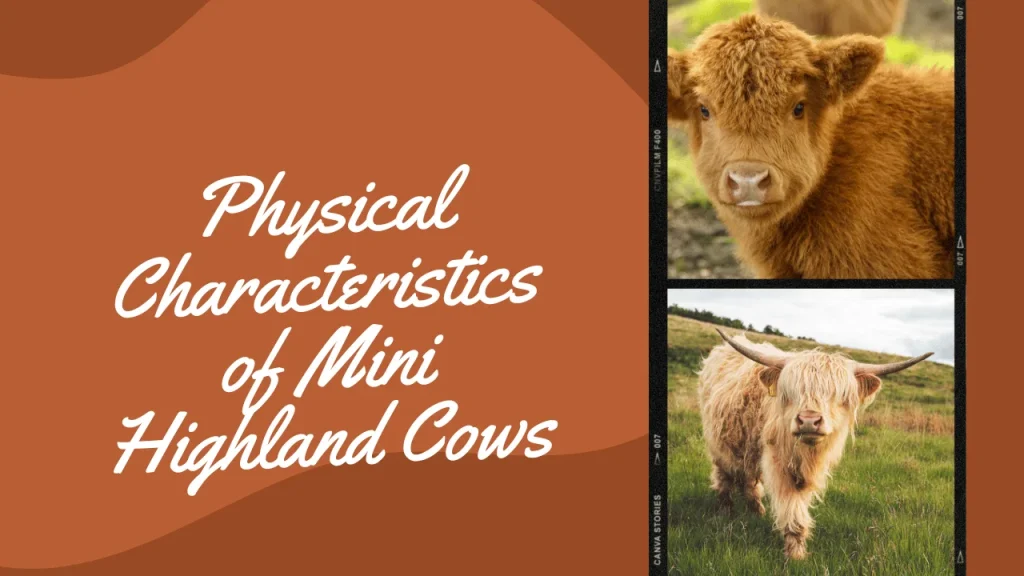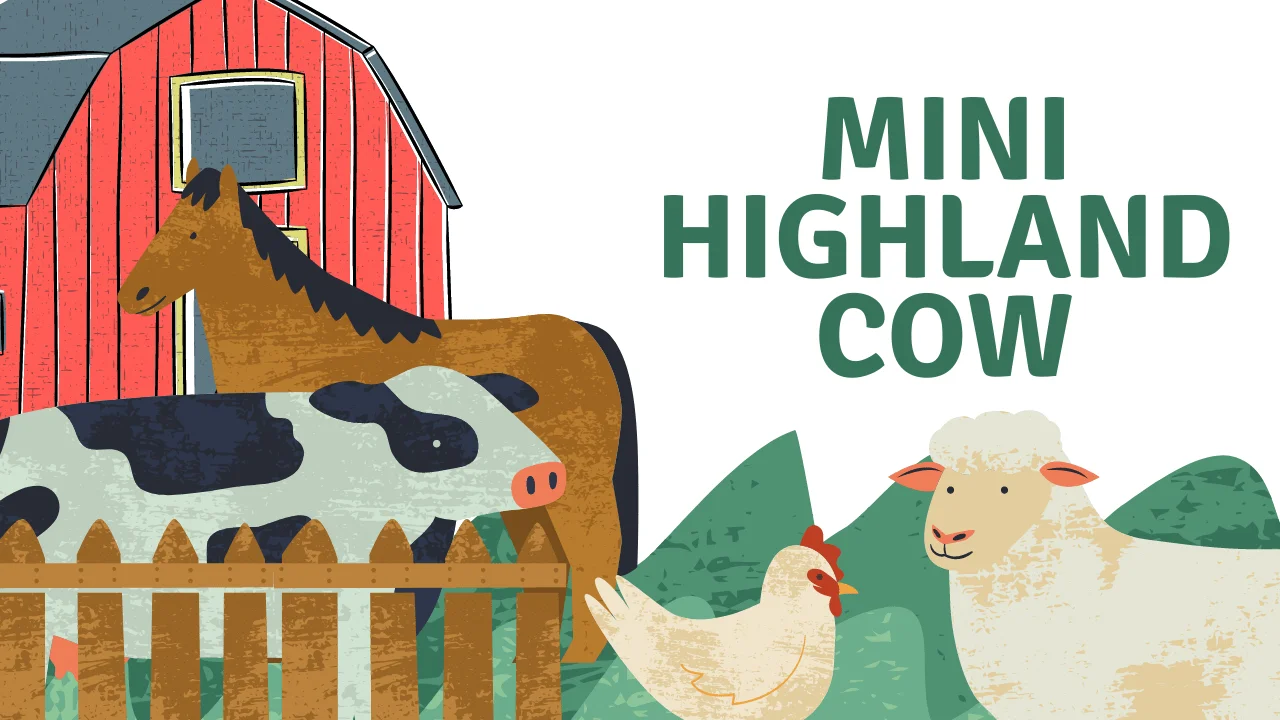Because of its diminutive stature and endearing personality, the mini Highland cow has won over many people. Charming and diminutive, this breed is a miniature take on the classic Scottish Highland cattle, famous for its adaptability and beauty. The miniature Highland cow is an ideal combination of benign temperament, practicality, and good looks, making it an ideal choice for homes with limited space, classrooms, or even as a pet. This article explores the fascinating world of miniature bovines, providing details about their care, lifestyle, and the many ways they can enrich different environments.
What is a Mini Highland Cow?
The miniature Highland cow, a smaller relative of the more famous Highland cattle, has its roots in the Scottish Highlands. These smaller variants, which range in height from 36 to 42 inches at the shoulder, are easily recognisable by their long, shaggy coats and enormous horns. Mini Highland cows are just as hardy and charming as their larger relatives, but they’re much smaller. With their thick coats, they can endure harsh weather conditions, and their amiable temperament is often praised. Because of this, they get along great with humans and are perfect for settings like petting zoos, hobby farms, and private residences.
Physical Characteristics of Mini Highland Cows

Distinctive Coats and Colors
The long, wavy coats of Mini Highland cows come in a rainbow of colours, from red and black to white and dun or brindle. Not only do these coats keep the cold out, but they also make them look great, which makes them perfect for photos and a hit at shows.
Compact Size and Build
Mini Highlands are more manageable and ideal for smaller acreages due to their shorter stature compared to regular cattle. They are strong and well-muscled, which makes them perfect for a variety of farming jobs, and their small stature doesn’t diminish their sturdy build.
Horn Development
Mini Highland cows, like their bigger relatives, grow horns that stand out. Used traditionally in their home country of Scotland to dig for hidden plants in the snow, these can serve dual purposes as an ornamental element and a tool.
Gentle and Friendly Nature
The placid nature of mini Highland cows is one of their most prized characteristics. These animals are perfect for farms that have a lot of guests or educational tours because of how calm and sociable they are.
Adaptability to Climates
Mini Highland cows are exceptionally versatile and can flourish in a wide range of climates, despite being native to the chilly, damp Highlands of Scotland. They are adaptable in habitats with little vegetation because of their thick coats, which keep them warm in winter and allow them to feed on rough vegetation.
Caring for Mini Highland Cows
Feeding and Nutrition
In terms of what they eat, Mini Highland cows aren’t picky. Because they do well on lower-quality feed, they are affordable for many smallholder farmers. Grass, hay, and the occasional grain supplement should be their mainstays for optimal health and vitality.
Health Management
To maintain good health in these small cows, regular vet visits are necessary for things like immunisations and parasite control. Even though they are resilient, they can still get the common bovine diseases, so it’s important to check on them often.
Grooming Needs
Mini Highland cows need their long coats brushed regularly to keep them comfortable and free of mats. Grooming needs to be ramped up at certain times of the year due to seasonal shedding as well.
Shelter and Space Requirements
Although mini Highland cows thrive in the great outdoors, it is important to provide them with proper shelter during storms and other severe weather events. Even though they don’t need a lot of room, giving them plenty to run around and graze will ensure their happiness and health.
Breeding Mini Highland Cows
Mini Highland cow reproductive health and requirements must be known for breeding purposes. To make sure bulls and cows are healthy enough to breed and have healthy babies, vets should check on them often.
Genetic Preservation
The mini Highland cow’s genetic purity should be the primary goal of breeding programmes. This necessitates meticulously choosing breeding pairs to guarantee the perpetuation of their distinct traits.
Challenges in Breeding
Ensuring the viability of the calves and the mother’s health during pregnancy are two of the many challenges that can arise when breeding miniature livestock. To successfully navigate these potential issues, you need breeding management with experience.
Mini Highland Cows as Family Pets
Behavior and Compatibility
Because of their placid temperament, Mini Highland cows make wonderful pets and are particularly well-suited to households with young children. They are great family pets because of how mild-mannered they are.
Training and Handling
Even though they’re small, mini Highland cows are surprisingly easy to train and handle. A strong bond between a cow and its owner can be achieved through the early instruction of basic commands and handling techniques.
Benefits of Owning Mini Highland Cows
Mini Highland cows are a wonderful addition to any family, offering a one-of-a-kind pet that is great company and adds a rustic flair to any home. Many people who love animals find them attractive because of how little they require in terms of care and how easily they can adapt.
Mini Highland Cows in Sustainable Agriculture
Role in Eco-Friendly Farming Practices
Because of their resilience and adaptability, Mini Highland cows make great sustainable agricultural partners. This promotes ecosystem biodiversity by reducing the need for artificial feeding and aiding in land management through natural means. They are able to keep pastures healthy without using chemical herbicides by controlling invasive plant species.
Impact on Soil Health
Mini Highland cows have a beneficial effect on soil health through their grazing habits. They improve water infiltration and decrease runoff by aerating the soil with their hooves. An essential component of regenerative farming practices, this kind of natural tilling helps boost the microbial activity necessary for fertile land.
Conservation of Heritage Breeds
Mini Highland cows are a valuable part of agricultural biodiversity because they help keep heritage breeds alive. The ability of future livestock populations to adapt and endure changing environmental conditions and diseases depends on the preservation of these genetic lines.
Mini Highland Cows in Urban and Suburban Settings
Ideal for Urban Farms
Space is often at a premium on urban farms, making mini Highland cows an ideal choice due to their diminutive stature and amiability. In addition to being an interesting tourist attraction, they can teach city dwellers about farming and cattle while also providing a sustainable supply of milk and meat.
Therapeutic Benefits
People living in cities can find solace in the company of miniature Highland cows. As a peaceful respite from city life, interacting with these mild-mannered animals can improve mental health and alleviate stress.
Community Engagement and Education
Community gardens and farms can greatly benefit from having Mini Highland cows as a teaching tool for sustainable agriculture and animal husbandry. They unite people in a common cause and show them where their food comes from in an agricultural setting.
Economic Aspects of Raising Mini Highland Cows
Cost-Effectiveness
Mini Highland cows may not be cheap, but they can end up saving small-scale farmers a lot of money in the long run. Their low feeding and maintenance costs, along with the possibility of earning money from selling milk, calves, or even organic meat, can make them a profitable investment.
Revenue Streams
As an agritourism business, mini Highland cow owners can provide farm stays, educational tours, and interactive experiences with their animals to diversify their income streams. Also, there are niche markets that are searching for sustainable, high-quality food options; you can reach them by selling premium organic beef or artisanal dairy products.
Market Demand
The demand for small-breed animals is on the rise, thanks to their use in sustainable agriculture and as household pets. As more people learn about the many advantages of mini Highland cows, their demand will rise and their market value could go up, making them a lucrative addition to small farms.
FAQs
Q: How long do mini Highland cows live?
Mini Highland cows typically live for 15 to 20 years, depending on their care and environment.
Q: Can mini Highland cows be trained?
Yes, they are intelligent and can be trained for basic tasks and to follow commands, making them easier to manage.
Q: What kind of shelter do mini Highland cows need?
They require a basic shelter that provides protection from extreme weather conditions but do not need elaborate housing.
Q: Are mini Highland cows good with children?
Yes, their gentle and calm demeanor makes them suitable companions for families with children.
Q: Can mini Highland cows produce milk for consumption?
Yes, they can produce milk, though in smaller quantities than larger dairy breeds, suitable for family consumption or small-scale artisanal production.
Conclusion
Finally, the mini Highland cow is well-liked by families and livestock enthusiasts for its charming combination of practicality, mild temperament, and attractive appearance. Miniature cattle are a joyful and useful addition to any environment, whether for farming, teaching, or just as a pet.

Aretha Davis, the wordsmith extraordinaire, weaves enchanting tales with her pen and keyboard. A renowned blogger and writer, her captivating prose transports readers to realms unknown. Join her literary journey and be swept away by the magic of her words.
